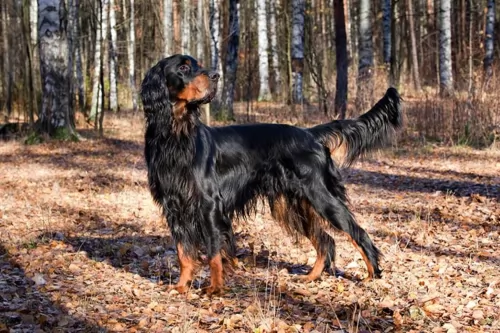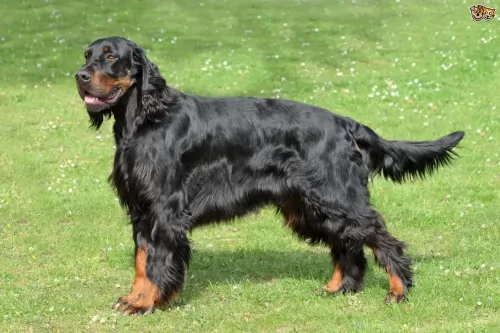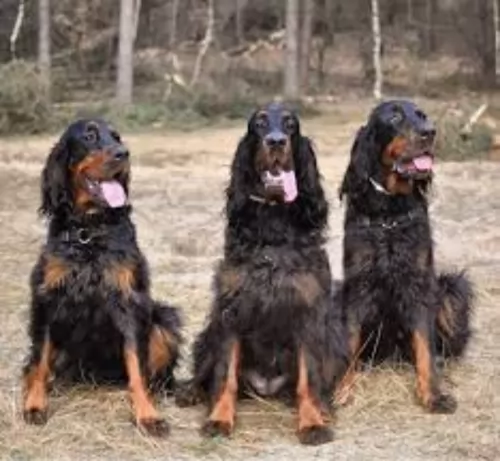 Petzlover
Petzlover Chesapeake Bay Retriever is originated from United States but Gordon Setter is originated from United Kingdom. Both Chesapeake Bay Retriever and Gordon Setter are having almost same height. Chesapeake Bay Retriever may weigh 9 kg / 20 pounds more than Gordon Setter. Both Chesapeake Bay Retriever and Gordon Setter has almost same life span. Both Chesapeake Bay Retriever and Gordon Setter has almost same litter size. Chesapeake Bay Retriever requires Low Maintenance. But Gordon Setter requires Moderate Maintenance
Chesapeake Bay Retriever is originated from United States but Gordon Setter is originated from United Kingdom. Both Chesapeake Bay Retriever and Gordon Setter are having almost same height. Chesapeake Bay Retriever may weigh 9 kg / 20 pounds more than Gordon Setter. Both Chesapeake Bay Retriever and Gordon Setter has almost same life span. Both Chesapeake Bay Retriever and Gordon Setter has almost same litter size. Chesapeake Bay Retriever requires Low Maintenance. But Gordon Setter requires Moderate Maintenance
 Fondly referred to as the Chessie, the ‘Labrador-look-alike’ Chesapeake Bay Retriever’s history extends to St. Johns Newfoundland pups which were rescued off a ship off the coast of Maryland in 1807. The Chesapeake is an American breed.
Fondly referred to as the Chessie, the ‘Labrador-look-alike’ Chesapeake Bay Retriever’s history extends to St. Johns Newfoundland pups which were rescued off a ship off the coast of Maryland in 1807. The Chesapeake is an American breed.
It is believed that the Newfoundland puppies as they grew, were bred with area dogs, with there being few records of the early dogs, but it is believed that spaniels and dogs were included.
In 1918 the Chesapeake Bay Retriever was recognized by the American Kennel Club and in 1964 the dog was declared the official dog of Maryland.
 The Gordon Setter includes mixes of the English Setter and the Irish Setter. The original purpose of the breed was to hunt game birds.
The Gordon Setter includes mixes of the English Setter and the Irish Setter. The original purpose of the breed was to hunt game birds.
The dog breed hails from Scotland with a history that dates back to the 17th century. The dog was developed in Gordon Castle by the Duke of Gordon IV.
The dog became popular among hunters in the early 19th century. He is the biggest of the setter breeds. It was in 1884 that the American Kennel Club recognized the Gordon Setter.
 The Chesapeake is a large dog belonging to the Sporting breed group. Perhaps one of the more distinctive features of the Chesapeake Bay Retriever is the yellowish eyes.
The Chesapeake is a large dog belonging to the Sporting breed group. Perhaps one of the more distinctive features of the Chesapeake Bay Retriever is the yellowish eyes.
This is a strong, well muscled dog that stands anywhere from 61 – 66cm and weighs between 30 – 45kg. The short, thick coat of the dog is waterproof and comes in colors ranging from brown to reddish yellow to chestnut shades.
The head of the Chesapeake is broad and roundish with medium length floppy ears. The tail is long. The toes are webbed which helps makes the dog an excellent swimmer as well.
The Chesapeake Bay Retriever is a happy kind of dog with a bright, alert, intelligent expression. He loves water and is guaranteed to make a wonderful pet for any family.
With his wonderful characteristics, it is worth training him and socializing him as this training sets parameters for him so that he becomes a wonderfully obedient dog that gets on well with other pets in the home as well as with children.
 The Gordon Setter is a large dog, capable of reaching up to 69cm in height and weighing up to 36kg in weight.
The Gordon Setter is a large dog, capable of reaching up to 69cm in height and weighing up to 36kg in weight.
He belongs to the Setter family and is somewhat heavier than the other Setter breeds. Setter dogs are classified as sporting- or gun dogs. He is a beautiful dog with a pitch black coat with tan markings found around the chest, muzzle and paws as well as those two familiar tan dots above each eye.
Sometimes you can find a small amount of white on the chest. The coat is straight and silky but it can be slightly waved with feathering around the legs, chest, ears and tail. Both the tail and the ears of the dog are also long and feathery. The Gordon has an intelligent, dignified look about him.
The Gordon Setter is a confident, fearless, loyal and affectionate dog. They do well with their human families, when there are other pets in the house as well as children.
He can be a boisterous dog so training and socialization will become necessary. Your Gordon Setter is an intelligent dog and also a dog ready and willing to learn. He is calm and even-tempered but playful too.
He isn’t a dog suited to life in the city if there isn’t an adequately sized garden. He is essentially a country life dog well suited to farms or large fenced gardens.
 The Chesapeake Bay Retriever is ready to be your best friend and companion. This dog breed is highly active and he’ll fit easily into a family that is active and can ensure he is involved in all their activities.
The Chesapeake Bay Retriever is ready to be your best friend and companion. This dog breed is highly active and he’ll fit easily into a family that is active and can ensure he is involved in all their activities.
The beauty about the Chesapeake Bay Retriever is that he is generally an even tempered dog, and once trained and socialized, becomes a truly splendid pet, one that will be loving and loyal with his owners.
 Beautiful to look at, the intelligent and even-tempered Gordon Setter has everything to be confident about. He loves the attention he gets from his human family and is always looking for a pat.
Beautiful to look at, the intelligent and even-tempered Gordon Setter has everything to be confident about. He loves the attention he gets from his human family and is always looking for a pat.
He can be stubborn and he certainly won't like the idea of being left cut off from his family for long periods of time as he is a social dog with those he knows and loves.
The Gordon Setter is energetic and playful so he will need regular exercise. When you bring a Gordon Setter into your home, you bring in a wonderfully loyal pet and companion.
 By taking good care of your Chesapeake, you can ensure his teeth remain strong, his nose is wet and his coat glossy and healthy. He is a robust breed as it is, but there are always some common dog diseases to watch out for -
By taking good care of your Chesapeake, you can ensure his teeth remain strong, his nose is wet and his coat glossy and healthy. He is a robust breed as it is, but there are always some common dog diseases to watch out for -
Obesity is an ailment that is afflicting many humans and their pets. Being overweight can bring on a host of unwanted diseases. Obesity is a serious disease that can contribute to digestive disorders, back pain, heart disease and joint problems.
Instead of showering him with little treats to show him how much you love him, rather stroke him or play a game with him – it’s the ultimate treat for him – your attention.
Remember that if you aren’t going to let your Chessie become a parent, the best thing you can do for your male or female is to have them spayed or neutered. In fact, spaying or neutering can decrease the likelihood of your pet getting certain types of cancers as well as other illnesses. Speak to your vet and discover how these procedures can be very beneficial for your pet.
 Life expectancy for the Gordon Setter is usually about 10 to 12 years and with good nutrition and care, your Gordon can easily reach 12 years of age.
Life expectancy for the Gordon Setter is usually about 10 to 12 years and with good nutrition and care, your Gordon can easily reach 12 years of age.
Every dog is prone to some common health issues and these include among others hip dysplasia, gastric torsion or bloat, retinal atrophy and ear infections.
Large dogs are more prone to hip dysplasia. The disease is a malfunction of the hip joints causing pain and loss of function in the rear legs.
This eye conditon just gets worse over time and can lead to vision loss.
An under-active thyroid causes a decrease in metabolism. Symptoms of hypothyroidism in dogs include weight gain, obesity, cold intolerance, changes in the skin and coat like hair loss and your dog is lethargic.
This can be very dangerous with your pet as the stomach is swollen and the stomach rotates and twists and can lead to death.
 The Chesapeake Bay Retriever sheds fairly heavily throughout the year. The coat should be brushed at least twice a week to remove dead hair. Brushing is good for the dog too as it distributes the oils of the skin, making his coat shinier.
The Chesapeake Bay Retriever sheds fairly heavily throughout the year. The coat should be brushed at least twice a week to remove dead hair. Brushing is good for the dog too as it distributes the oils of the skin, making his coat shinier.
Because the Chesapeake has floppy ears, the ears will need to be checked on a weekly basis for signs of infection. This is of particular importance if your Chessie loves to spend time splashing around in water. The veterinarian can recommend and also advise on cleaners for your dog’s ears.
An excellent diet and plenty of exercise will ensure your Chessie can live to be 11, 12 or 13 years of age. You want to keep his diet of kibble, rice, vegetables and meat consistent so as not to upset his stomach.
Avoid giving him foods such as chocolates. Do research on the harm you can do to your pet when you feed him some human foods that are entirely not meant for a dog’s digestive system.
The Chesapeake Bay Retriever has always loved to be active - hunting for- and retrieving birds from rivers and lakes. He is used to being active and will require a good supply of exercise. Take him for long walks and let him join you on your runs or your cycling.
 Gordon Terriers are energetic dogs so he is going to require a good deal of exercise each day. Take him with you on your walks and make sure that you give him lots of ball games and rope games.
Gordon Terriers are energetic dogs so he is going to require a good deal of exercise each day. Take him with you on your walks and make sure that you give him lots of ball games and rope games.
All Gordon Setters shed, and their coat will require a good brushing at least twice a week. Check nails, teeth and ears regularly. Brush teeth at least twice a week to prevent dental decay.
As a working dog your Gordon Setter has a special need for a high fat content diet. You can include some raw meat in his high-energy dog kibble. He can also have some cooked brown rice, chicken and vegetables added into his kibble from time to time. Make sure he has access to fresh, cool water.